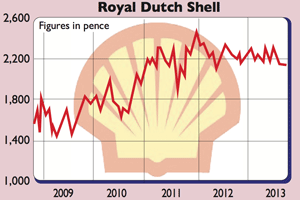The Shell BG deal will be the first of many – which oil giant is next?
Shell's takeover of BG Group will spark a wave of mergers in the energy sector. John Stepek asks – who will be next?

Get the latest financial news, insights and expert analysis from our award-winning MoneyWeek team, to help you understand what really matters when it comes to your finances.
You are now subscribed
Your newsletter sign-up was successful
Want to add more newsletters?

Twice daily
MoneyWeek
Get the latest financial news, insights and expert analysis from our award-winning MoneyWeek team, to help you understand what really matters when it comes to your finances.

Four times a week
Look After My Bills
Sign up to our free money-saving newsletter, filled with the latest news and expert advice to help you find the best tips and deals for managing your bills. Start saving today!

Of all the takeover rumours that constantly ride the City merry-go-round, the idea that Royal Dutch Shell would one day buy BG has to be one of the most persistent.
And now it's no longer a rumour.
Shell is buying BG for the equivalent of £13.50 a share. That's roughly 50% over and above the prevailing share price before the news came out.
MoneyWeek
Subscribe to MoneyWeek today and get your first six magazine issues absolutely FREE

Sign up to Money Morning
Don't miss the latest investment and personal finances news, market analysis, plus money-saving tips with our free twice-daily newsletter
Don't miss the latest investment and personal finances news, market analysis, plus money-saving tips with our free twice-daily newsletter
That's great news if you're a relatively recent BG shareholder, clearly. What the rest of us want to know now is who's next?
This is one of the biggest deals ever
On another interesting point, James Mackintosh notes in his FT column that the Shell BG deal is the ninth-biggest merger deal ever. That's not good company to keep five of the top ten were tech-bubble era deals, and three came just before the Lehman Brothers bust. In other words, this sort of scale of deal tends to happen before crashes.
However, while I'd agree that shares in general are overvalued, it's hard to make the case that this specific instance is about chief executive ego gone mad. Instead, it looks Shell is taking advantage of the plunging oil price to make a move.
Why is Shell buying BG? If there's one thing an oil and gas company needs, it's a plentiful source of oil and gas for the future. And the simple answer is that, right now, it's easier and cheaper to buy BG than for Shell to find more of its own reserves.
The BG deal will increase Shell's oil and gas reserves by around 25%. And it'll boost production by 20%. According to the FT, by 2018, Shell could be producing more oil and gas than ExxonMobil currently the biggest non-state producer. It's already the global leader in liquefied natural gas, and this deal will cement that.
That's good news for Shell. By comparison to some of the other big players, Shell has had problems replacing the reserves it has already pumped out.
BG directors have recommended the deal, and it's likely to be completed by early 2016. If you own BG, it's probably worth hanging on for now at least you never know, someone else might fancy coming in with a higher bid.
As for the rest of the sector, the big question now has to be who's next?
We're going to see a wave of mergers in the oil sector
In other words, expect more mergers and takeovers. ExxonMobil has already mentioned that it's open to the idea of doing deals. And Bob Dudley at BP noted that he expected the oil price environment to remain similar to the 1980s, which is when many of the mega-mergers that shaped today's oil giants took place.
The other point to remember is that chief executives are just like everyone else. They see action and they start to panic they want to be part of it. Their shareholders will be asking why they're not doing deals too. Fee-hungry bankers will be putting ideas in their heads. Their own egos will look enviously on the praise being heaped on Shell boss Ben van Beurden by an excitable press.
As the BG deal shows, pretty much no one is safe. Even a big player like BP has frequently been cited as a possible target you have to imagine that someone out there is running the slide rule over it.
And elsewhere in the sector, all those funds out there with money to spend on distressed' assets will now be looking to act before someone else does. The last thing they want is takeover fever driving up prices and leaving them stranded.
So regardless of what happens to the oil price and with Iran coming back online potentially, we could be looking at a suppressed price for quite some time it looks like share prices in the sector are set to benefit from a wave of speculation.
We looked at the oil sector, and flagged up some potential ways to play a merger boom, in a recent issue of MoneyWeek magazine. Subscribers can read the piece here and if you're not already a subscriber, sign up to get your first four issues free here.
Get the latest financial news, insights and expert analysis from our award-winning MoneyWeek team, to help you understand what really matters when it comes to your finances.

-
 Should you buy an active ETF?
Should you buy an active ETF?ETFs are often mischaracterised as passive products, but they can be a convenient way to add active management to your portfolio
-
 Power up your pension before 5 April – easy ways to save before the tax year end
Power up your pension before 5 April – easy ways to save before the tax year endWith the end of the tax year looming, pension savers currently have a window to review and maximise what’s going into their retirement funds – we look at how
-
 Should you be worried about energy windfall tax proposals?
Should you be worried about energy windfall tax proposals?Analysis Calls have been growing for a windfall tax on UK oil and gas producers. It's a popular idea, but is it a good one? And what does it mean for investors in the UK's energy companies? Rupert Hargreaves explains.
-
 The outlook for Shell shares is mixed, despite bumper profits
The outlook for Shell shares is mixed, despite bumper profitsAnalysis With profits surging, it looks as if Shell is on a roll, but the company’s growth from here is hard to see as Rupert Hargreaves explains.
-
Share tips of the week
Tips MoneyWeek’s comprehensive guide to the best of this week’s share tips from the rest of the UK's financial pages.
-
 Investors can no longer be sure of Shell
Investors can no longer be sure of ShellNews Oil giant Royal Dutch Shell, one of the market’s most reliable income providers, has cut its dividend for the first time in over 70 years. Matthew Partridge reports.
-
Company in the news: Royal Dutch Shell
Features A shock profit warning from Royal Dutch Shell has taken the City by surprise. Phil Oakley explains what that means for investors.
-
 Today’s profit warning looks like a good time to buy Shell
Today’s profit warning looks like a good time to buy ShellFeatures Shares in Shell took a hit after the company's profits warning. But that doesn't mean you should sell, says Antonia Oprita. In fact, now may be time to buy.
-
Three stocks to buy with future income in mind
Opinion Professional investor Ben Ritchie picks three robust stocks that should generate a sustainable and growing dividend for future income.
-
 Shares in focus: Can Shell deliver the goods?
Shares in focus: Can Shell deliver the goods?Features Oil giant Shell is out of favour with the City, but does its dividend yield make the shares worth buying? Phil Oakley investigates.